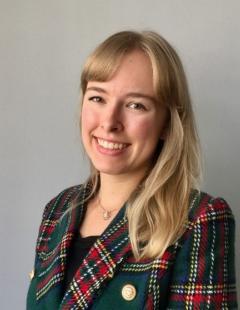Jana Konle
Tell us about your background
Originally from Lüneburg, Germany, I have lived in the UK for the past four years. After having worked for Amnesty International in Berlin for a year, I studied Philosophy, Politics and Economics at King's College London, focusing on Political Economy from Year 2 onwards. I always enjoyed the breadth of thematic areas covered in PPE, so applying for Global Governance & Diplomacy felt like a natural progression in uncovering a more holistic perspective on the world's most pressing issues and potential solutions.

“As a Course Representative, I was able to experience first-hand how attentive academic and administrative staff throughout ODID are to the feedback of students.”
“As a Course Representative, I was able to experience first-hand how attentive academic and administrative staff throughout ODID are to the feedback of students.”
What made you choose to study at ODID?
ODID is globally renowned for its impactful cutting-edge research, scrutinising and informing policy-making, and the professors are leading experts in their research areas. I was excited by the prospect of being surrounded by and learning from like-minded individuals with different academic and personal backgrounds in an intellectually stimulating environment.
What do you particularly like about ODID?
For most of my course mates and me, ODID has become a second home over the past nine months. Whether mingling with students from other courses and learning more about their research in the main hall ahead of lectures, indulging in the amazing lunch served afterwards, or attending office hours with any questions or concerns, ODID makes its students feel supported. As a Course Representative, I was able to experience first-hand how attentive academic and administrative staff throughout ODID are to the feedback of students. The networks established here are made to last.
What do you particularly like about your course of study?
I particularly enjoyed the combination of theory with the exploration of dilemmas arising from the practical application of global governance and diplomacy. We covered the theoretical bases and were subsequently introduced to different issue areas which require global governance and (digital) diplomacy – either inherently or due to the effects of globalisation – often complemented by first-hand experiences in the GGD Speaker Series. This approach is equally stimulating to students aiming to pursue an academic path, and those who have their eye on a more applied career. Furthermore, the limited number of students allows the cohort to grow really close, and facilitates genuine learning from each other in the seminars.
What did you research for your dissertation?
My dissertation explores how norm convergence has influenced the cooperation of Russia and China in the Shanghai Cooperation Organisation between 2001 and 2022. Employing a constructivist approach to Stephen M. Walt's neorealist Balance of Threat theory, I find that shared perception of threat to the principle of sovereignty by the West as a shared 'Other' triggers norm convergence on non-interference which allows for cooperation to arise. In the absence of threat, cultural and historical differences, rooted in state identity, come to the fore between China and Russia, leading to divergence in their conceptualisations of sovereignty and hierarchical governance aspirations resulting therefrom.
What other activities have you been involved with at Oxford?
During the first vacation I took part in a micro-internship with Oxford Net Zero and CO2RE which allowed me to engage with the practical side of holding cities, countries and companies accountable for their emissions while meeting many lovely students from other departments. In my free time, I started rowing with the Novice team of Lincoln College Boat Club in Michaelmas and moved up to the women's 3rd boat in Hilary. The early-morning outings on the Isis, the supportive team environment and the all-round excitement among rowers and non-rowers during the Regattas are definitely some of my fondest Oxford memories.
Is life at Oxford different from how you expected it to be?
Moving to Oxford from London, I was constantly struck by the size difference. The University makes the city and while there is beauty to overhearing academic conversations wherever one goes and partaking in the many more or less popular traditions, it can be quite overwhelming at times. Hence, I found it helpful to take up a new hobby, gather with course mates outside of the classroom and explore the scenic surroundings of the city to de-stress.
What advice would you give to someone thinking of applying?
Know what you are getting yourself into, and why. GGD is a work-intensive course requiring you to learn about the contents of four modules and write a dissertation within nine months. At the same time, it is an extremely rewarding academic experience with countless 'pinch me' moments, which allows you to make connections that last a lifetime. Approaching the application process with a clear idea of why you are the right candidate for this particular course at this time in your journey, and how you hope it will help you achieve your goals, showcases your uniqueness and readiness to tackle this challenge.
